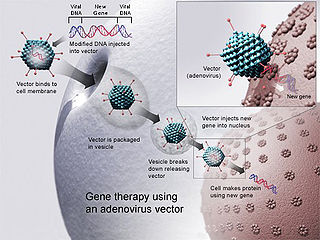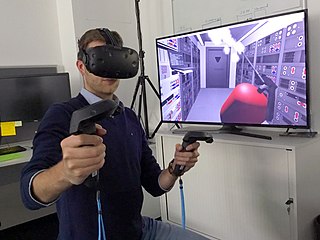
Gene therapy is a medical field which focuses on the genetic modification of cells to produce a therapeutic effect or the treatment of disease by repairing or reconstructing defective genetic material. The first attempt at modifying human DNA was performed in 1980, by Martin Cline, but the first successful nuclear gene transfer in humans, approved by the National Institutes of Health, was performed in May 1989. The first therapeutic use of gene transfer as well as the first direct insertion of human DNA into the nuclear genome was performed by French Anderson in a trial starting in September 1990. It is thought to be able to cure many genetic disorders or treat them over time.

Technology is the result of accumulated knowledge and application of skills, methods, and processes used in industrial production and scientific research. Technology is embedded in the operation of all machines, with or without detailed knowledge of their function, for the intended purpose of an organization. The technologies of society consist of what is known as systems. Systems operate by obtaining an input, altering this input through what is known as a process, and then producing an outcome that achieves the intended purpose of the system.

Transhumanism is a philosophical and intellectual movement which advocates for the enhancement of the human condition by developing and making widely available sophisticated technologies that can greatly enhance longevity and cognition. It also predicts the inevitability of such technologies in the future.

Virtual reality (VR) is a simulated experience that can be similar to or completely different from the real world. Applications of virtual reality include entertainment, education and business. Other distinct types of VR-style technology include augmented reality and mixed reality, sometimes referred to as extended reality or XR.
The technological singularity—or simply the singularity—is a hypothetical point in time at which technological growth becomes uncontrollable and irreversible, resulting in unforeseeable changes to human civilization. According to the most popular version of the singularity hypothesis, called intelligence explosion, an upgradable intelligent agent will eventually enter a "runaway reaction" of self-improvement cycles, each new and more intelligent generation appearing more and more rapidly, causing an "explosion" in intelligence and resulting in a powerful superintelligence that qualitatively far surpasses all human intelligence.
An artificial organ is a human made organ device or tissue that is implanted or integrated into a human — interfacing with living tissue — to replace a natural organ, to duplicate or augment a specific function or functions so the patient may return to a normal life as soon as possible. The replaced function does not have to be related to life support, but it often is. For example, replacement bones and joints, such as those found in hip replacements, could also be considered artificial organs.

Michio Kaku is an American theoretical physicist, futurist, and popularizer of science. He is a professor of theoretical physics in the City College of New York and CUNY Graduate Center. Kaku is the author of several books about physics and related topics and has made frequent appearances on radio, television, and film. He is also a regular contributor to his own blog, as well as other popular media outlets. For his efforts to bridge science and science fiction, he is a 2021 Sir Arthur Clarke Lifetime Achievement Awardee.

A designer baby is a baby whose genetic makeup has been selected or altered, often to include a particular gene or to remove genes associated with disease. This process usually involves analysing a wide range of human embryos to identify genes associated with particular diseases and characteristics, and selecting embryos that have the desired genetic makeup; a process known as preimplantation genetic diagnosis. Other potential methods by which a baby's genetic information can be altered involve directly editing the genome before birth. This process is not routinely performed and only one instance of this is known to have occurred as of 2019, where Chinese twins Lulu and Nana were edited as embryos, causing widespread criticism.

Personalized medicine, also referred to as precision medicine, is a medical model that separates people into different groups—with medical decisions, practices, interventions and/or products being tailored to the individual patient based on their predicted response or risk of disease. The terms personalized medicine, precision medicine, stratified medicine and P4 medicine are used interchangeably to describe this concept though some authors and organisations use these expressions separately to indicate particular nuances.
Human enhancement (HE) can be described as the natural, artificial, or technological alteration of the human body in order to enhance physical or mental capabilities.

Emerging technologies are technologies whose development, practical applications, or both are still largely unrealized, such that they are figuratively emerging into prominence from a background of nonexistence or obscurity. These technologies are generally new but also include older technologies. Emerging technologies are often perceived as capable of changing the status quo.

Immersion into virtual reality (VR) is a perception of being physically present in a non-physical world. The perception is created by surrounding the user of the VR system in images, sound or other stimuli that provide an engrossing total environment.

Physics of the Future: How Science Will Shape Human Destiny and Our Daily Lives by the Year 2100 is a 2011 book by theoretical physicist Michio Kaku, author of Hyperspace and Physics of the Impossible. In it Kaku speculates about possible future technological development over the next 100 years. He interviews notable scientists about their fields of research and lays out his vision of coming developments in medicine, computing, artificial intelligence, nanotechnology, and energy production. The book was on the New York Times Bestseller List for five weeks.

Genome editing, or genome engineering, or gene editing, is a type of genetic engineering in which DNA is inserted, deleted, modified or replaced in the genome of a living organism. Unlike early genetic engineering techniques that randomly inserts genetic material into a host genome, genome editing targets the insertions to site specific locations.

Hao Li is a computer scientist, innovator, and entrepreneur from Germany, working in the fields of computer graphics and computer vision. He is founder and CEO of Pinscreen, Inc, as well as associate professor of computer vision at the Mohamed Bin Zayed University of Artificial Intelligence (MBZUAI). He was previously a Distinguished Fellow at the University of California, Berkeley, an associate professor of computer science at the University of Southern California, and former director of the Vision and Graphics Lab at the USC Institute for Creative Technologies. He was also a visiting professor at Weta Digital and a research lead at Industrial Light & Magic / Lucasfilm.

Virtual reality applications are applications that make use of virtual reality (VR), an immersive sensory experience that digitally simulates a virtual environment. Applications have been developed in a variety of domains, such as education, architectural and urban design, digital marketing and activism, engineering and robotics, entertainment, virtual communities, fine arts, healthcare and clinical therapies, heritage and archaeology, occupational safety, social science and psychology.

Aspects of genetics including mutation, hybridisation, cloning, genetic engineering, and eugenics have appeared in fiction since the 19th century.

Year Million is a six-part documentary and science fiction television series produced by National Geographic, which premiered on May 15, 2017, on their channel. The series received two Emmy Award nominations, including a Primetime Emmy for its narrator Laurence Fishburne. The series is based on the 2008 book Year Million: Science at the Far Edge of Knowledge by Damien Broderick. The narrative alternates tells the story of a family of three in the future, using 2016 interviews to explain events unfolding in the story. The series was filmed in Budapest.














